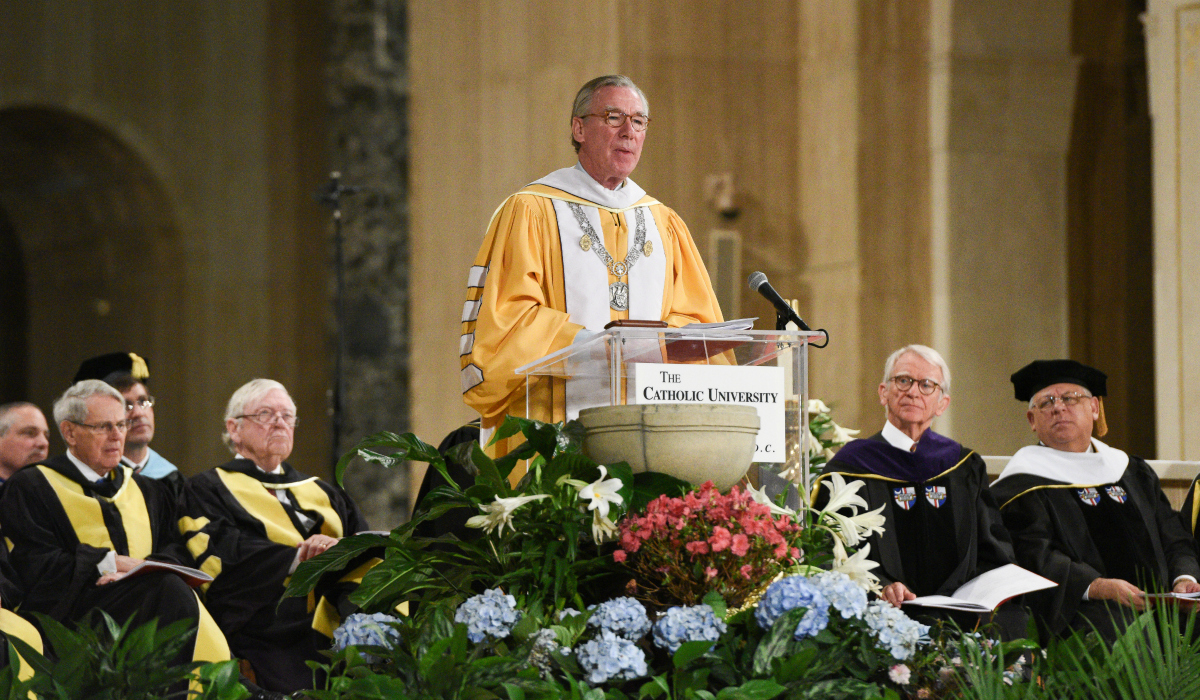

President Garvey's Commencement Remarks
128th Annual Commencement
Upper Church, Basilica of the National Shrine of the Immaculate Conception
May 13, 2017
Every year I like to commend the practice of a virtue to our graduates. This year I want to say a word about studiousness.
I know, some of you are thinking, “You’re four years too late.” And others (maybe the philosophers) are thinking, “That’s a virtue?”
It is. And it’s not just a virtue for students. It will serve you well as you begin the next chapter of your lives. Most of you have been in school for sixteen years. Studying has been your full time job. Now you will have new responsibilities: deadlines for work, phone calls to return, meetings to attend. These things are important. But they leave little time for reflection, contemplation, or sustained attention to any object of thought.
It’s not only external events (meetings, phone calls) that distract us. Just as often the interruption comes from within. The poet Mary Oliver says that we have “a self within the self that whistles and pounds upon the door panels and tosses itself, splashing, into the pond of meditation.”[1] It reminds you that “you must phone the dentist, that you are out of mustard, that your Uncle Stanley’s birthday is two weeks hence.”[2]
Today, the Internet makes it particularly easy to distract ourselves. Think about how many times a day you check your phone (Apple says the average iPhone user unlocks his phone 80 times a day[3]) or social media (Facebook says the average user spends 50 minutes a day on the site[4]) or simply get lost browsing the web. You only intended to look up the date of the Gettysburg Address. An hour later you’re reading about mutant super-viruses.
But I digress.
Studiousness is the virtue that moderates our natural desire to know so we can devote our attention to the right things in the right way.[5]
This is important because there is, in fact, a right way to know things. We are inundated with information. We cram and consume it, we sell it, we use it to impress people at parties. It is easy to forget that there is a difference between information and knowledge, and that the difference consists in thinking about the information we have. In his memoir, the former Soviet spy and writer Whittaker Chambers tells a story about watching his daughter sit in her highchair smearing porridge on her face. He came to believe in God while contemplating “the delicate convolutions of her ear.” “Those intricate, perfect ears,” Chambers thought, “could have been created only by immense design.” (Chambers would have missed this moment if he had been scrolling through his news feed.) The world is a gift from God. It takes its form from his wisdom. Studiousness disposes us to know the world with wonder and gratitude. Ultimately it points us toward God.
This brings me to my second point. Studiousness is a virtue that prepares us for the spiritual life. There are times in life when it seems as if God is silent. Many great saints have experienced a “dark night of the soul,” a sense of abandonment by God. St. Therese of Lisieux writes in her spiritual autobiography about the “thickest darkness” which God permitted to invade her soul.
But before we conclude that God is really being silent, we ought to ask ourselves whether we are really listening. When the Lord called to Samuel in a dream, Eli instructed him to say, “Speak, Lord, for your servant is listening.”[6]
Prayer, the philosopher Simone Weil observed, “is the orientation of all the attention of which the soul is capable towards God.”[7] This is harder than it sounds. Often, Weil says, we confuse attention “with a kind of muscular effort.” We furrow our brows, purse our lips, hold our breath. This is not attention. True attention, she writes, “consists of suspending our thought, leaving it detached, empty and ready to be penetrated by the object.”
Studiousness is the virtue of attention.[8] It disposes us to want the truth, to seek it ardently, but also to wait attentively on it. When you practice studiousness in your daily life—when you read a book, look at a painting, talk to a friend—it prepares you to give your full attention to God “If we concentrate our attention on trying to solve a problem of geometry,” Weil observed, “and if at the end of an hour we are no nearer to doing so than at the beginning, we have nevertheless been making progress each minute of that hour in another more mysterious dimension. . . . It is certain that this effort will bear its fruit in prayer.”
Over the last four years you have spent many hours studying. But allow me to offer you some parting advice on cultivating the virtue of studiousness.
[1] Mary Oliver, “Of Power and Time,” Upstream, 23.
[2] Id. at 24.
[3] https://developer.apple.com/videos/play/wwdc2016/705/
[5] Thomas Aquinas, Summa Theologiae II-II.166.2, corpus and replies 2 and 3.
[6] 1 Samuel 3:10
[7] Simone Weil, “Reflections on the Right Use of School Studies with a View to the Love of God,” In Waiting on God, trans. Emma Craufurd (New York: C.P. Putnam's Sons, 1951), 1 http://www.hagiasophiaclassical.com/wp/wp-content/uploads/2012/10/Right-Use-of-School-Studies-Simone-Weil.pdf
[8] Gregory M. Reichberg, "Studiositas, the Virtue of Attention," in The Common Things: Essays in Thomism and Education. Edited by Daniel McInerney (Washington, D.C.: Catholic University of America Press, 1999), 151 https://maritain.nd.edu/ama/McInerny/McInerny11.pdf
[9] Weil, 3.
[10] Mary Oliver, “Upstream,” Upstream, 8.